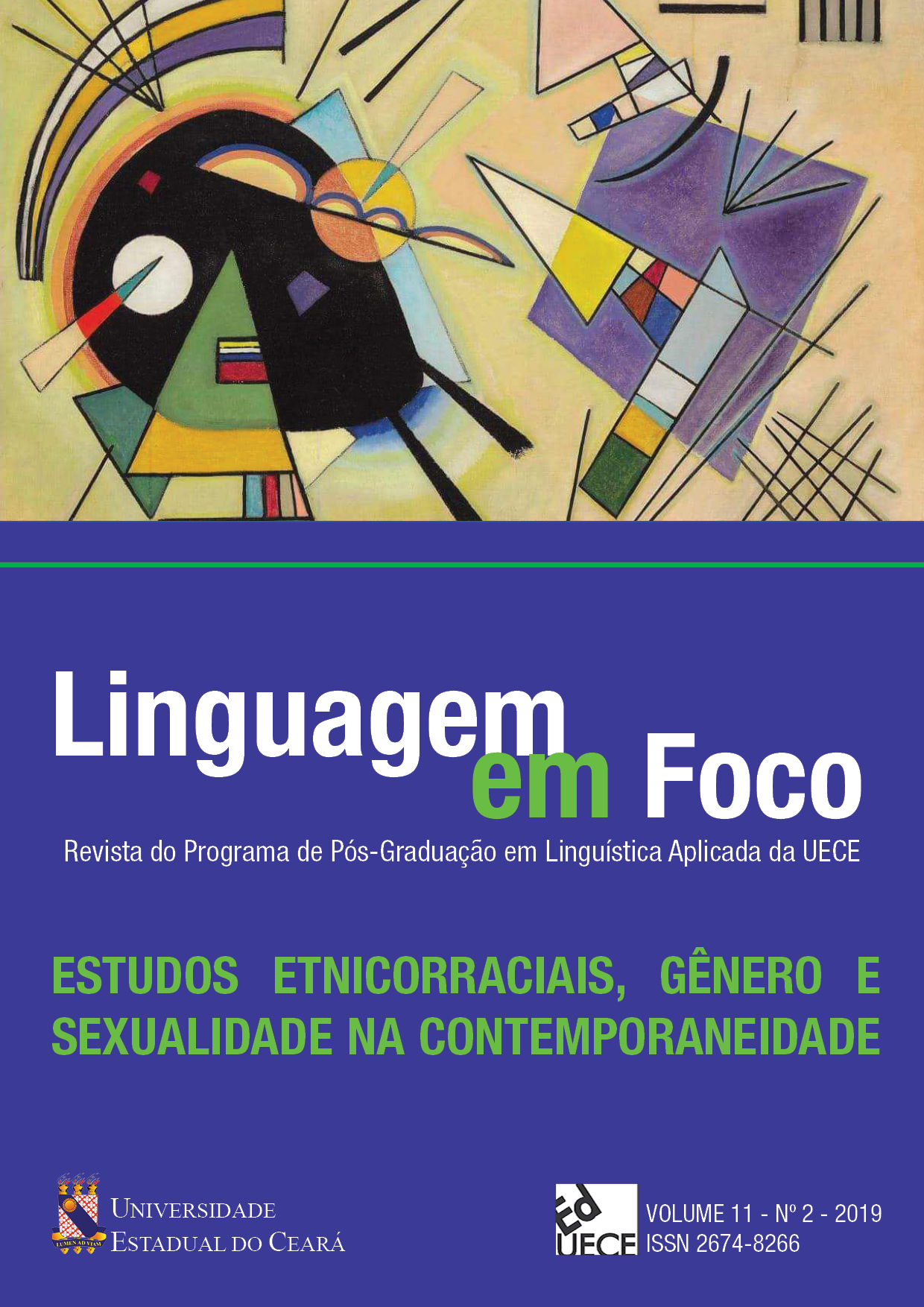“A Coisa Tá Preta”
Uma Análise Discursiva Acerca da Ressignificação da Expressão Idiomática no Videoclipe de Rincon Sapiência
DOI:
https://doi.org/10.46230/2674-8266-11-2917Palavras-chave:
Linguística, Análise do Discurso, Identidade cultural, Expressão idiomáticaResumo
O presente artigo traz, à luz da análise do discurso materialista histórica, uma reflexão discursiva acerca do dito popular de senso comum “a coisa tá preta” e a forma como ele é ressignificado no videoclipe da música homônima do rapper Rincon Sapiência. Intuindo alcançar o objetivo proposto, foi feita uma análise utilizando como base os escritos de Eni Orlandi (2006, 2012, 2015) a fim de compreender as principais noções teóricas que ampararam este estudo discursivo. No que diz respeito à compreensão acerca do rap como gênero musical coadunamos com Fleury e Souza (2015) que retratam o gênero como exemplo de identidade cultural do povo negro. Ademais, no que tange às expressões idiomáticas, utilizamos os estudos de Urbano (2008) e, para contemplar a temática de identidade cultural, Gomes (2003).
Downloads
Referências
BURGESS, J. YouTube e a Revolução Digital: como o maior fenômeno da cultura participativa transformou a mídia e a sociedade. Tradução de Ricardo Giassetti. São Paulo: Aleph, 2009.
CHARAUDEAU, P.; MAINGUENEAU, D. Dicionário de Análise do Discurso. 3. ed. São Paulo: Contexto, 2016.
EQUIPE NOISEY. A coisa tá preta no novo clipe do Rincon Sapiência. NOISEY, 13 maio 2016, web. Disponível em: <https://noisey.vice.com/pt_br/article/rbnqez/rincon-sapiencia-a-coisa-ta-preta-clipe>. Acesso em: 25 out. 2018.
FLEURY, M. C.; SOUZA. Identidade Cultural na Música Negra: o exemplo do soul e do rap. In: III Congresso Internacional do Curso de História da UFG/Jataí: História e Diversidade Cultural, 2012, Jataí. Anais. Jataí: UFG, 2012. Disponível em: <http://www.congressohistoriajatai.org/anais2012/Link%20(75).pdf>. Acesso em: 16 out. 2018.
GOMES, N. L. Corpo e cabelo como símbolos da identidade negra. In: II Seminário Internacional de Educação Intercultural; Gênero e Movimentos Sociais, 2003, Florianópolis. Anais. Florianópolis: UFSC, 2003.
MARIANI, B.; MAGALHÃES, B. Lacan. In: OLIVEIRA, L. A. Estudos discursivos: perspectivas teóricas. 1. ed. São Paulo: Parábola Editorial, 2013. Cap. 4, p. 101-122.
MONTEIRO-PLANTIN, R. S. . Fraseologia: era uma vez um patinho feio no ensino de língua materna. 1. ed. Fortaleza: Imprensa Universitária, 2014. v. 1. 309p. Disponível em: <http://www.repositorio.ufc.br/bitstream/riufc/10310/1/2014_liv_rsmplantin.pdf>. Acesso em: 16 dez. 2019.
ORLANDI, E. de L. P. Análise de Discurso. In: ORLANDI, Eni Puccinelli ; LAGAZZI, S.M (Orgs.). Introdução às Ciencias da Linguagem: Discurso e Textualidade. 3. ed. Campinas: Pontes, 2006. p. 16-35.
ORLANDI, E. P. Discurso e texto: formação e circulação dos sentidos. Campinas, SP: Pontes, 2012.
ORLANDI, E. P. Análise de discurso: princípios e procedimentos. Campinas: Pontes, 2015.
ORLANDI, E. P. Análise de Discurso. In: ORLANDI, E.P.; LAGAZZIRODRIGUES, S. (Orgs.). Introdução às ciências da linguagem: Discurso e textualidade. Campinas: Pontes, 2017.
A COISA TÁ PRETA. Compositor: Rincon Sapiência; Direção: Luis Rodrigues; Rincon Sapiência. Produção: Porqueeu Filmes. 13 maio 2016. 4:17 min. YouTube. Disponível em: <https://www.youtube.com/watch?v=FsTTvHoLxEA>. Acesso em: 01 out. 2018.
SANTOS, S. S. B. Pêcheux. In: OLIVEIRA, L. A. Estudos discursivos: perspectivas teóricas. São Paulo: Parábola Editorial, 2013. Cap. 8, p. 209-234.
SERRANO, C. Ginga, a rainha quilombola de Matamba e Angola. Revista USP, n. 28, p. 136-141, 01 mar. 1996.
URBANO, H. Da fala para a escrita: o caso de provérbios e expressões populares. Investigações, Pernambuco, v. 21, n. 2. 2008. Disponível em: <https://periodicos.ufpe.br/revistas/index.php/INV/article/view/1417>. Acesso em: 20 out. 2018.
XATARA, Claudia. Dicionário de expressões idiomáticas. web, 2013. Disponível em: <http://www.deipf.ibilce.unesp.br/pt/busca.php>. Acesso em: 26 out. 2018.
Downloads
Publicado
Como Citar
Edição
Seção
Licença
Copyright (c) 2020 Thauany Ferreira Amaro, Antonio Carlos Santana de Souza

Este trabalho está licenciado sob uma licença Creative Commons Attribution 4.0 International License.
Os autores que publicam na Linguagem em Foco concordam com os seguintes termos:
- Os autores mantêm os direitos autorais e concedem à revista o direito de primeira publicação. Os artigos estão simultaneamente licenciados sob a Creative Commons Attribution License que permite a partilha do trabalho com reconhecimento da sua autoria e da publicação inicial nesta revista.
- Os conceitos emitidos em artigos assinados são de absoluta e exclusiva responsabilidade de seus autores. Para tanto, solicitamos uma Declaração de Direito Autoral, que deve ser submetido junto ao manuscrito como Documento Suplementar.
- Os autores têm autorização para disponibilizar a versão do texto publicada na Linguagem em Foco em repositórios institucionais ou outras plataformas de distribuição de trabalhos acadêmicos (ex. ResearchGate, Academia.edu).





























